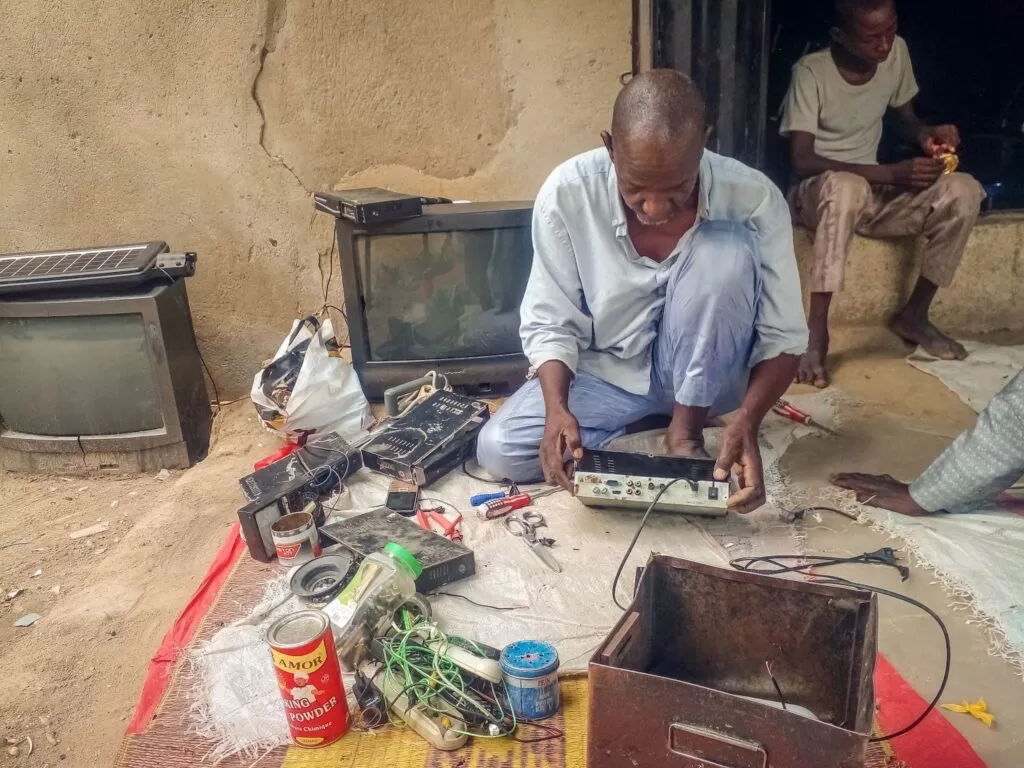It was a cold Tuesday morning in Maiduguri, northeastern Nigeria. Shop apprentices, owners, and traders were opening their businesses in the Babban Layi area, a commercial hub in the heart of the city. Most traders here deal in new and used electronics, and their daily rituals marked the start of another busy day. Among them, 28-year-old Ibrahim Haruna Hashim could be seen carefully sweeping the floor of his shop filled with scrap electronics, a routine he performs promptly at 8:30 a.m. each morning.
Around him, other shopkeepers were unlocking their doors, their shops filled with the same type of merchandise—parts and devices far removed from their original owners in Asia and Europe. These shops formed an unintentional electronics recycling hub, where discarded devices from distant places found a new purpose. Here, traders like Ibrahim scrape by to make a living. Yet, behind the walls of these shops lurks an invisible danger: hazardous waste that accumulates, untouched and unregulated, posing a severe threat to both human health and the environment.
In the late 1980s, stricter environmental regulations in industrialised countries sharply raised the costs of hazardous waste disposal, leading waste traders to seek cheaper options by exporting waste to developing countries. Incidents of hazardous waste being dumped in these countries—often without the means to manage it safely—highlighted the need for global cooperation to prevent such practices.
These events spurred the adoption of the Basel Convention on the Control of Transboundary Movements of Hazardous Wastes and Their Disposal, established in March 1989 and came into force in 1992.
For Nigeria, a signatory since 1991, implementing the Convention’s mandates remains challenging. Despite laws prohibiting hazardous imports, informal recycling hubs like Babban Layi continue to thrive, underscoring the ongoing struggle to enforce effective waste management policies—a fight with high stakes for communities that depend on this informal economy for their livelihood.
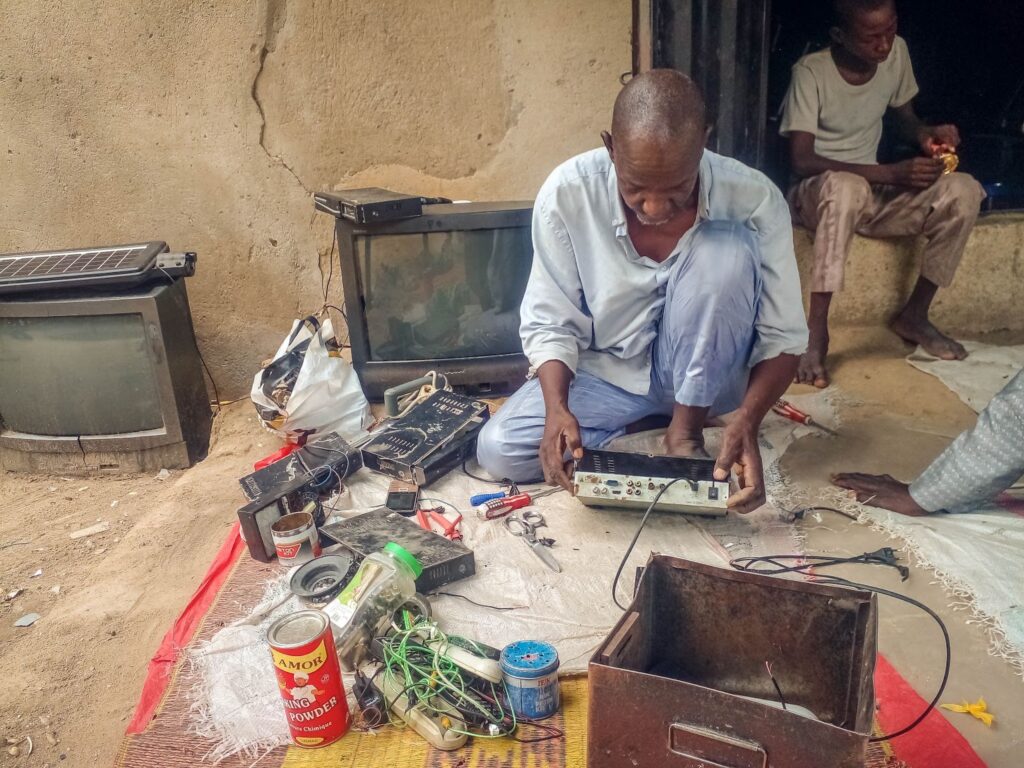
Policies left on paper
Nigeria’s waste management policies appear robust on paper, with laws like the National Environmental Standards and Regulations Enforcement Agency (NESREA) regulations, the Basel Convention, the Harmful Waste (Special Criminal Provisions) Act, and the Environmental Impact Assessment Act. These policies aim to control hazardous waste, particularly the import and export of e-waste. However, practical enforcement falls short, and policy goals remain largely unmet. NESREA, tasked with regulating waste imports, struggles to prevent the influx of banned items, as seen in markets like Babban Layi in Maiduguri, where weak border controls and the resilience of the informal economy highlight significant enforcement gaps.
Much of the waste in Babban Layi originates from Europe and Asia, entering Nigeria primarily through neighbouring countries like the Republic of Benin. “We usually buy the used electronics from Lagos, Jos, and Kano,” Ibrahim explains, gesturing toward a pile of fans and stabilisers. “Most of these electronics are imported from China and Europe. They are brought in through Cotonou.” His shop, filled with items unlikely to be repaired or sold, portrays the gap between policy and practice, revealing how enforcement remains inadequate, especially regarding import bans and waste tracking.
This disconnection between NESREA’s framework and operations at Babban Layi reflects a broader enforcement shortfall. Despite NESREA’s guidelines, insufficient border checks and monitoring allow unregulated e-waste to flow into the country. Informal recyclers, driven by economic need, fuel demand for these materials, creating a cycle of illegal imports and unregulated processing. By contrast, countries like South Korea and Belgium successfully implemented Basel standards with stringent customs checks and advanced recycling infrastructure. Adopting similar measures, such as more robust border controls and investment in local recycling facilities, could significantly impact Nigeria.
In economically challenged areas like Maiduguri, waste regulation feels secondary to survival. For Ibrahim and others, what is considered ‘waste’ elsewhere is their path to wealth. “A better future would be for us to get support to develop technical skills for handling these electronics or even to manufacture them,” Ibrahim says. Yet without proper enforcement of international standards, the risk of exposure to hazardous materials grows, endangering workers and their environment.
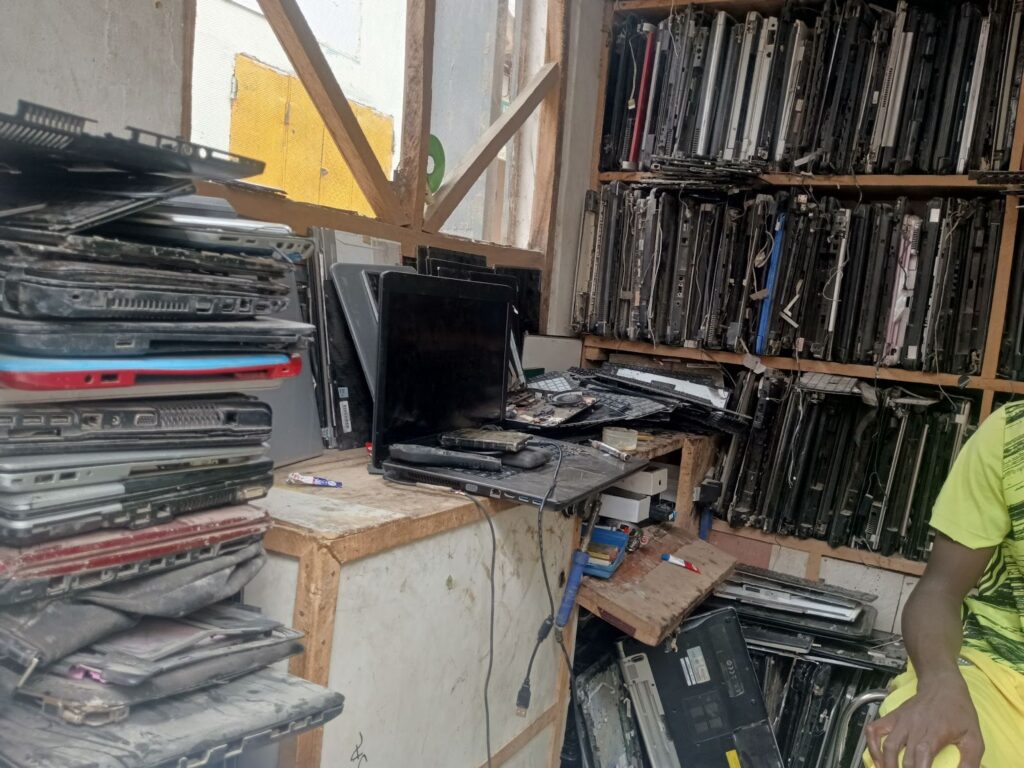
NESREA’s limitations reveal deeper issues in Nigeria’s waste management framework. Although the Harmful Waste Act criminalises hazardous waste imports, prosecutions are rare, suggesting a lack of political will. The Environmental Impact Assessment Act mandates environmental evaluations for projects, but informal recyclers often bypass these, working without protective measures and exposing their communities to severe health risks. Addressing these gaps will require reforms focused on practical enforcement, public awareness, and greater accountability.
Profits from waste, risks unseen
Nigeria’s informal waste sector relies on a multi-tiered supply chain beginning with international suppliers—primarily from Europe and Asia—who export second-hand electronics and plastics. These goods travel from major Nigerian ports like Lagos to inland markets nationwide, including Maiduguri’s Babban Layi and the GSM Village at Bullumkuttu. Here, informal recyclers dismantle, repurpose, or resell them, sustaining countless families and creating a demand-supply cycle that keeps recyclers locked into waste processing.
At a glance, a section of the city’s GSM Village seems like any other bustling market: a steady flow of customers, a cacophony of bargaining voices, and shopkeepers like 46-year-old Bukar Mallum Bura, who spends his days trading scrap phone parts. “We get these parts by buying them from people who find them in dustbins and dumping sites,” Bukar explains. “When someone brings their phone for repair, they usually leave the scrap parts behind, and we use the parts that still work.”
Each day, traders in this section of the GSM Village sift through discarded items, buying usable scraps at modest prices. Bukar can purchase batteries for as little as ₦500 [$0.30], a screen here, a keypad there, piecing together devices that find new life in the informal market. However, despite the flourishing reuse economy, the risk issue looms large and remains unaddressed. For Bukar, the prospect of hazard seems distant. His days are filled with teaching the Quran to his students, interwoven with his time in his shop. “My business,” he reflects, “is my livelihood, not a danger.”
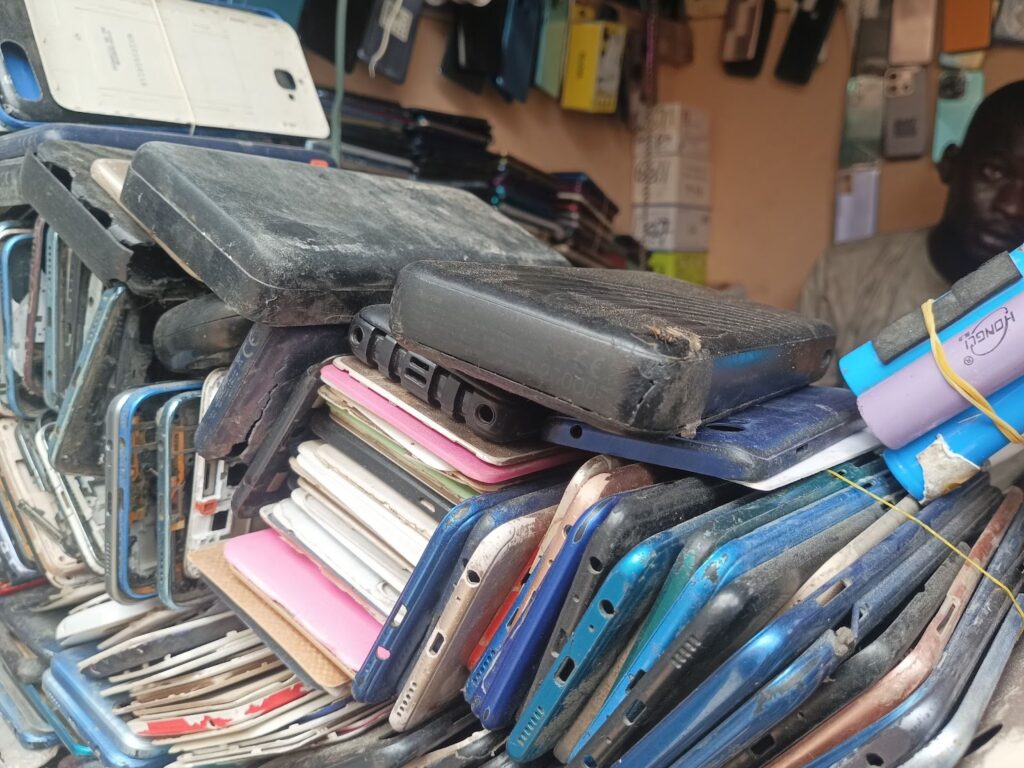
For recyclers like him, profits are modest but essential. “I approximately make around ₦4000 [$2.43] or ₦3000 [$1.82] or even less than that,” he says. While this reliance on imported waste sustains livelihoods, it also casts Nigeria as a “dumping ground” for Western e-waste. This underscores the urgent need for a formalised recycling economy that could reduce dependence on low-value imports while fostering sustainable economic growth.
It is a sentiment echoed by Abdurahman Muhammad Ladan, a 24-year-old plastic waste trader. “I do not know anything related to the fact that these waste materials I am buying and selling have hazards. I have never heard of that,” he said. Every day, he buys around 70 to 80 kilos of plastic waste at ₦150 [$0.091] per kilo, collecting materials from dumpsites and sorting them for resale to larger markets in Kano and Lagos. For Abdurahman, as for many in this sector, knowledge of potential health risks associated with hazardous waste is scarce, leaving them vulnerable to exposure without any protective measures.
The invisible costs
Informal recyclers face serious health risks tied to handling electronic and plastic waste. When improperly processed, electronic waste releases toxins like lead, mercury, and cadmium, which can cause respiratory illnesses, cancers, and neurological damage. “The long-term impact is for the e-waste recyclers to have personal protective equipment (PPE) for their work,” advised Dr Oluwaseun Anselm, an Environmental Chemistry scholar. However, without proper training or access to protective gear, recyclers like Bukar are exposed daily to these hazards, endangering their health and that of their families.
The environmental consequences of unregulated waste imports and informal processing are equally severe, resulting in soil and water contamination in areas with high waste processing activity. “The GSM Village has no specific containers for dumping electronic waste. We just dump it in front of our shops, and the cleaners will sweep it along with other waste,” explained Abdullahi Barka, an artisan at Maiduguri’s GSM Village.
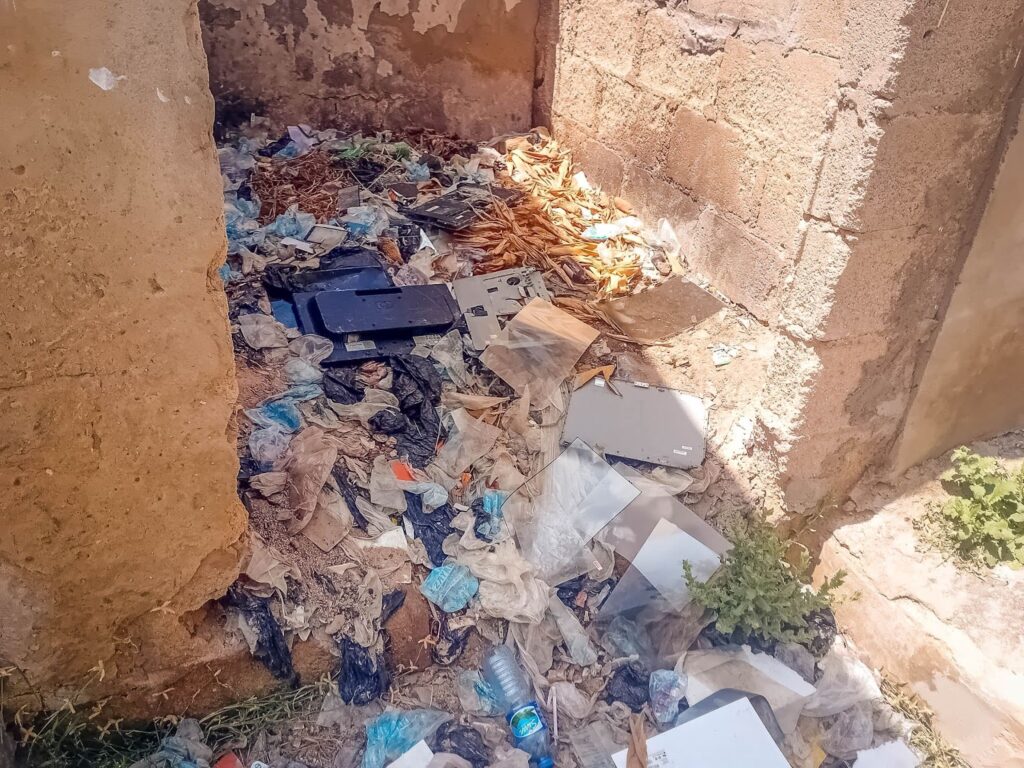
Toxic metals leach into the soil and waterways, threatening nearby communities and diminishing agricultural productivity. Nigeria’s environmental policies aim to mitigate such pollution, but weak enforcement has unchecked this contamination. Case studies from countries like South Korea demonstrate that structured recycling facilities can significantly reduce environmental harm, indicating that Nigeria could benefit from adopting similar waste management models.
The human cost of these policy gaps is evident in stories like Ibrahim’s. He and his family face daily exposure to hazardous waste, unaware of the associated risks or having access to health monitoring. Driven by a desire to fund his children’s education, Ibrahim’s experience highlights the urgent need for interventions that protect health and provide sustainable livelihoods. His story underscores the human impact of Nigeria’s waste crisis and the need for reform that prioritises vulnerable populations.
HumAngle contacted the Borno State Ministry of Environment in writing on Oct. 16th and followed up on the 20th, 22nd, and 27th to request comments regarding their efforts to regulate waste in the state. However, we have not received a response at the time of publication.
The paths toward safer, regulated recycling in Nigeria
Given the challenges in these markets, it is evident that for Nigeria to honour its commitment to the Basel Convention genuinely, a stronger emphasis on enforcement and education is crucial. NESREA and other responsible agencies must work more closely with communities to enforce import restrictions and provide local traders with the skills and resources they need to work safely. Traders like Ibrahim are hopeful for support, envisioning a future where they can grow their businesses responsibly. He says, “The government could help us by providing training on handling these electronics and, one day, maybe even how to manufacture them ourselves.”
Drawing from conversations with stakeholders, HumAngle found that partnerships with development agencies could play a key role here. Introducing educational programmes to inform traders about the dangers of handling electronic waste while offering safer recycling practices could go a long way in mitigating health risks. Additionally, implementing waste separation and treatment facilities in major trading centres like Maiduguri, Kano, and Lagos would help establish an infrastructure aligned with the Basel Convention’s objectives, transforming informal recycling into a safer, regulated sector.
In many ways, the story of Maiduguri’s informal recyclers reflects Nigeria’s larger struggle to reconcile economic survival with sustainable policy. For Ibrahim, Bukar, and Abdurahman, the future is uncertain—filled with potential but shadowed by unseen risks. Their lives portray the urgent need for a balance between economic growth and health-conscious policies, a balance that the Basel Convention, with all its promises, was meant to inspire. Yet, until the policy becomes practical, commercial communities in Maiduguri and other Nigerian cities will continue to bear the hidden costs of a global waste trail, and the promises of the Basel Convention will remain just that: promises on paper.
